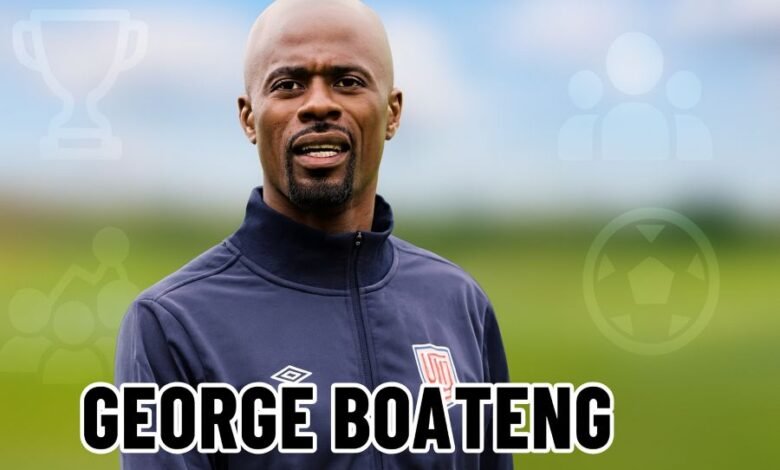
Table of Contents
ToggleIntroduction
George Boateng is a name that commands respect in the world of football. Known for his unwavering work ethic, discipline, and leadership both on and off the pitch, Boateng’s career reflects determination and adaptability. Rising from humble beginnings in Ghana to becoming a celebrated Dutch international and later a respected coach, he stands as a symbol of resilience and passion for the game. His evolution from player to mentor showcases how perseverance and purpose can shape a lasting legacy in sports.
Quick Bio
| Attribute | Details |
|---|---|
| Full Name | George Antwi Boateng |
| Date of Birth | 5 September 1975 |
| Birthplace | Nkawkaw, Ghana |
| Nationality | Dutch (Ghanaian-born) |
| Height | 1.78 meters |
| Position | Defensive Midfielder |
| Occupation | Former Footballer, Football Coach |
| International Team | Netherlands |
| Coaching License | UEFA Pro License |
| Notable Clubs | Feyenoord, Aston Villa, Middlesbrough, Hull City |
| Religion | Christian |
Early Life and Background
George Boateng was born in Nkawkaw, Ghana, on September 5, 1975. His early years were spent surrounded by the vibrant culture of Ghana, where football was more than a sport — it was a way of life. At the age of ten, Boateng’s family relocated to the Netherlands, a move that would define his future.
In the Netherlands, he quickly adapted to a new culture while nurturing his love for football. His natural athleticism and dedication caught the attention of local scouts, leading him to youth clubs like VV Spijkenisse and later Excelsior Rotterdam. His ability to blend Ghanaian flair with Dutch discipline made him a standout young player with immense potential.
The Start of a Professional Career
Boateng began his professional journey with Excelsior in 1994. His strong defensive instincts and tactical intelligence soon earned him a transfer to Feyenoord, one of the Netherlands’ biggest clubs. At Feyenoord, he showcased his technical maturity and became known for his ball-winning skills and relentless energy in midfield.
His performances in the Eredivisie opened doors to the English Premier League. In 1997, Boateng signed with Coventry City, marking the start of a remarkable chapter in English football. His determination and leadership qualities quickly made him a fan favorite and laid the foundation for his long-term Premier League career.
Rise in the Premier League
After impressive performances at Coventry City, George Boateng moved to Aston Villa in 1999. His time at Villa Park saw him mature into one of the league’s most consistent defensive midfielders. He played a crucial role in helping Villa reach the 2000 FA Cup Final and became known for his composure under pressure.
In 2002, Boateng transferred to Middlesbrough, where he achieved some of the most memorable moments of his career. As team captain, he led by example, guiding Middlesbrough to victory in the 2003–04 Football League Cup — the club’s first-ever major trophy. His leadership extended beyond the pitch, motivating younger players and inspiring teamwork through discipline and humility.
International Career with the Netherlands
Though born in Ghana, George Boateng proudly represented the Netherlands at the international level. His consistent performances in English football earned him a call-up to the Dutch national team in 2001.
Between 2001 and 2006, he made four senior appearances for the Netherlands and was also part of the Under-21 squad earlier in his career. Competing alongside world-class players, Boateng demonstrated tactical awareness and reliability in defensive midfield roles, further solidifying his status as one of the most dependable players of his era.
Transition into Coaching and Leadership
After retiring as a player, Boateng turned his attention to coaching — a natural transition for someone with his experience and understanding of the game. In 2014, he took on his first major managerial role with Kelantan FC in Malaysia, where he began shaping his coaching philosophy centered on discipline, youth development, and teamwork.
He later moved into youth coaching roles in England, working with Blackburn Rovers and then Aston Villa as a development coach. His impact on young players was profound, instilling professionalism and mental strength. In 2022, Boateng joined the Ghana National Team as an assistant coach, bringing his international experience full circle. His latest appointments, including work with Coventry City and RAEC Mons, show his continuous evolution as a modern, tactically sharp coach.
Achievements and Honors
Throughout his career, George Boateng accumulated a list of impressive accomplishments. He won the 2003–04 Football League Cup with Middlesbrough — a historic moment that remains a highlight of both his career and the club’s history.
He also featured in major cup finals, including the 2006 UEFA Cup Final with Middlesbrough and the 2000 FA Cup Final with Aston Villa. His success is not only measured by trophies but by the leadership, professionalism, and respect he earned across clubs and nations.
Personality, Beliefs, and Values
Known for his humility and discipline, Boateng’s personality has been central to his success. He is a devout Christian who attributes much of his perseverance to faith and family values. On and off the pitch, he exemplifies sportsmanship, self-control, and dedication. His multilingual background and cross-cultural experience allow him to connect with players from diverse backgrounds, making him a respected mentor and coach.
Legacy and Impact
George Boateng’s legacy extends far beyond his playing statistics. He represents the journey of a former footballer who transformed challenges into opportunities. From Ghanaian streets to the grand arenas of Europe, his story inspires young athletes to dream big, work hard, and stay grounded.
His contributions to both Dutch and Ghanaian football reflect a bridge between continents — blending African passion with European tactical precision. As a coach, his focus on youth development ensures that his influence will continue to shape football’s future for years to come.
Conclusion
George Boateng’s journey embodies resilience, ambition, and transformation. From his modest beginnings to captaining in the Premier League and mentoring the next generation, he has shown what persistence and integrity can achieve. His name stands as a beacon for aspiring players and coaches who aim to make a lasting mark through hard work and humility.
As he continues his coaching career, Boateng remains a role model for leadership and excellence — proving that true greatness lies not just in success, but in the ability to uplift others along the way.
FAQs
Q1: Who is George Boateng?
George Boateng is a Ghanaian-born Dutch former footballer and professional coach known for his leadership and success in the English Premier League and international football.
Q2: What is George Boateng best known for?
He is best known for his time with Middlesbrough, where he captained the team to win the 2003–04 Football League Cup — the club’s first major trophy.
Q3: Did George Boateng play for Ghana?
No, he represented the Netherlands national team, earning four senior caps between 2001 and 2006.
Q4: What clubs did he play for during his career?
Boateng played for Excelsior, Feyenoord, Coventry City, Aston Villa, Middlesbrough, Hull City, Skoda Xanthi, Nottingham Forest, and T-Team.
Q5: What is George Boateng doing now?
As of 2025, George Boateng continues his career as a football coach, contributing to player development and tactical training at the professional level.




